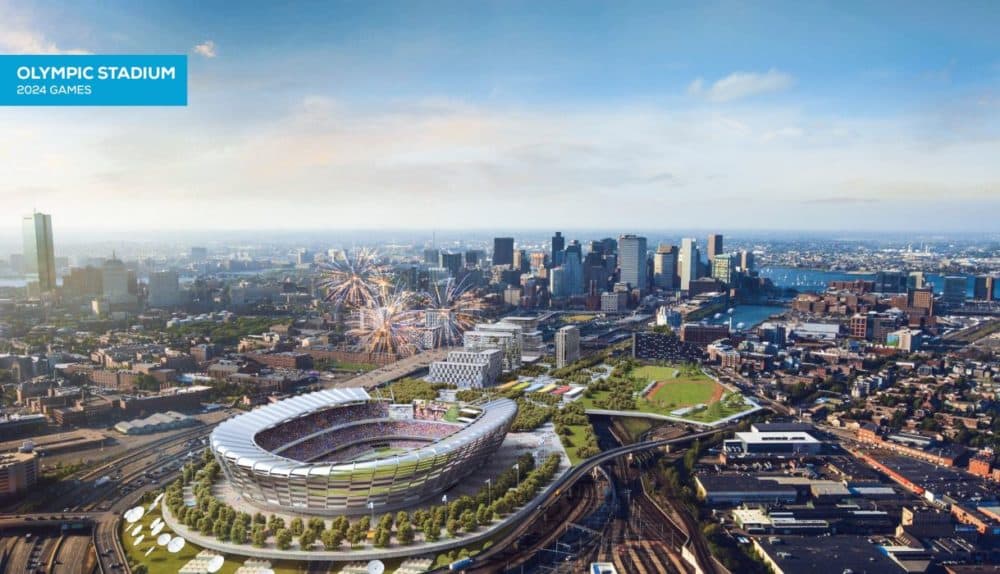Advertisement
Backers, Opponents Joust At Olympics TV Debate

Arguments over the Olympics came to a head Thursday. A Boston Globe/FOX 25 debate, which also aired on WBUR-FM, pitted two top supporters of a Boston Olympic bid against two leading opponents.
One of the two opponents, Andrew Zimbalist, scored the first memorable line of the debate. The Smith College economist questioned Boston 2024’s characterization of its revised bid plan, so-called "bid 2.0."
"They have a 'conservative approach,' " Zimbalist said of Boston 2024's proposal. "Everything they’re putting out before the public is a 'conservative' number. Well, in fact, most of the numbers that I look at reflect drunken optimism. They don’t reflect conservatism."
Dan Doctoroff called Zimbalist's assessment unfair and inaccurate.
"I couldn't disagree with that more," said Doctoroff, who led New York City’s unsuccessful bid for the 2012 Summer Games and is now a board member on the U.S. Olympic Committee. He sat next to Boston 2024’s new chair, Steve Pagliuca, and backed him up.
"More transparency is always better, OK? And I think there clearly were mistakes made up until a few months ago," Doctoroff said. "I think what we’ve seen over the last two months, really since Steve came on board, is quite remarkable."
Doctoroff and Pagliuca argued that the Olympics are a “once in a lifetime” chance to drive Boston’s economic development.
But the two opponents argued that public money would have to cover much of the total costs.
Chris Dempsey, co-chair of No Boston Olympics, said that Boston 2024 is "not proposing to take private dollars and to invest them in the [MBTA]."
Advertisement
"They have a $4.6 billion [Olympic] budget, with some of the TV rights that Dan’s talking about, and not a penny goes to improvements for the MBTA," Dempsey said.
Boston 2024 took issue with that, saying nearly $100 million of private funding would be spent on a new commuter rail station at Widett Circle, where the Olympic Stadium would be. Dempsey said it's private funding from developers induced by tax breaks, not money from ticket sales or TV contracts. Still, that seemed to be supporters’ debate strategy: to call the opponents over the top in their criticisms.
"I think it’s hyperbolic to say that," Pagliuca said. "It’s also hyberbolic to say there was a subpoena order issued; there was no subpoena order issued."
At the same time, Dempsey tried to portray Boston 2024 as teaming up with outsiders like Doctoroff not as invested in Boston’s future.
"I was one of the commuters in Boston, while you were in New York, that was unable to get to work this February because our MBTA broke down," Dempsey said to Doctoroff. "So for you to come up from New York and to tell us you have a better idea of how to run the city doesn’t make sense..."
No Boston Olympics declined to name all of its individual funders, saying they fear retribution. Doctoroff gave no specific benchmarks or timeline for when the USOC wants to see higher public support.
Supporters also tried to brush off criticism of their plan to issue huge tax breaks to develop Widett Circle and the athlete village at Columbia Point. Pagliuca said he'd take the best deal for the city, potentially no tax breaks.
At times, the four debaters really got into it. Take the so-called taxpayer guarantee, the customary requirement for the public to be a fallback for an Olympics bid. Pagliuca said Boston 2024’s plan has insurance to protect taxpayers against cost overruns.
And just as the debate was starting to feel like a robust back-and-forth argument, it was time for closing statements.
The four debaters talked passionately after it was over for a good 15 minutes. The public conversation will continue.
No one may have won the debate, but people watching and listening really for the first time got to see supporters and opponents of Boston’s Olympics bid stand eye-to-eye.
This segment aired on July 24, 2015.
